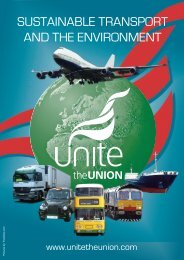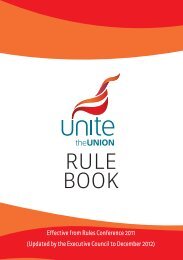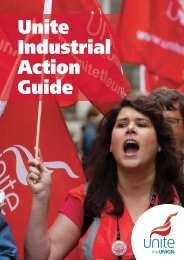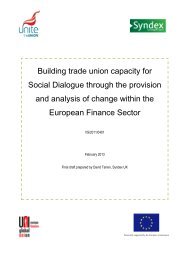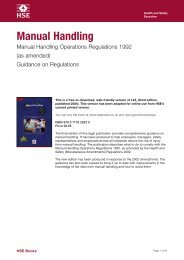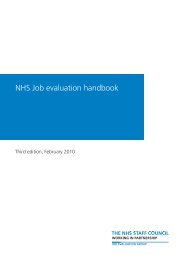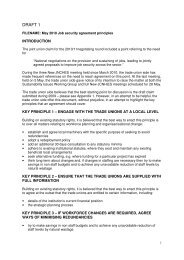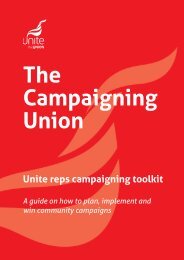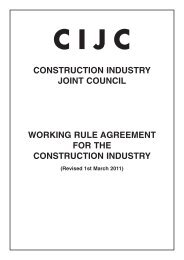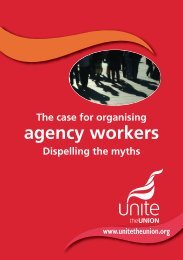Making Companies Safe - what works? (CCA ... - Unite the Union
Making Companies Safe - what works? (CCA ... - Unite the Union
Making Companies Safe - what works? (CCA ... - Unite the Union
Create successful ePaper yourself
Turn your PDF publications into a flip-book with our unique Google optimized e-Paper software.
When safety does not pay (or does not pay fast enough)<br />
In an overview of <strong>the</strong> literature, Wright found that whilst <strong>the</strong> research indicates that<br />
employers in <strong>the</strong> <strong>Unite</strong>d States are motivated by <strong>the</strong> need to reduce <strong>the</strong> costs of ill-health and<br />
injury under certain circumstances, this finding is not replicated in <strong>the</strong> UK. 3 Similarly, Hillage<br />
et al. conclude, after <strong>the</strong>ir review of <strong>the</strong> evidence, that<br />
“Compliance with <strong>the</strong> law is generally a bigger motivator for employers than<br />
achieving business benefits.” 4<br />
For instance, an evaluation of <strong>the</strong> ‘Good Health is Good Business’ campaign, which aimed to<br />
persuade employers of <strong>the</strong> business case for occupational health improvements, reported<br />
that:<br />
• only 1% of respondents cited <strong>the</strong> wish to avoid loss of business as a reason for<br />
initiating health and safety improvements;<br />
• only 1% cited ‘productivity’ as a reason;<br />
• no respondents cited evidence of adverse commercial impacts;<br />
• and only 1% cited reducing costs. 5<br />
Wright concludes that:<br />
“These contrasting findings can be related to differences in health care insurance<br />
and compensation arrangements. USA organisations directly incur a high<br />
proportion of <strong>the</strong> cost of injury and ill-health in <strong>the</strong> form of health and worker<br />
compensation insurance premiums.” 6<br />
By contrast in <strong>the</strong> UK, <strong>the</strong> costs of occupational injury, death and ill-health are borne mainly<br />
by victims, <strong>the</strong>ir families and <strong>the</strong> state, and not by employers. 7 So whilst <strong>the</strong>re may be isolated<br />
cases where safety pays, 8 <strong>the</strong>re will be numerous instances where safety does not pay. 9<br />
Wright <strong>the</strong>refore argues that:<br />
“<strong>the</strong> economic model of voluntary self-compliance is unlikely to be of general<br />
relevance in <strong>the</strong> UK without a substantial change in <strong>the</strong> level and/or allocation<br />
of financial liabilities.” 10<br />
Also, where <strong>the</strong> costs of injury or ill-health do outweigh <strong>the</strong> costs of measures needed to<br />
prevent <strong>the</strong>m, Johnson and Kaplan have shown how current accounting practices, which<br />
are designed to calculate ‘return on investment’ over a period of only one or two years, fail<br />
to accurately calculate <strong>the</strong> savings to be made from health and safety improvements,<br />
since such savings often only accrue over a period of several years. 11 Moreover, accounting<br />
practices simply reflect <strong>the</strong> fact that corporations are judged principally on a short-term basis.<br />
Thus it is not just accounting practice, but <strong>the</strong> short-term thrust of capitalist markets in<br />
general that fur<strong>the</strong>r reduces <strong>the</strong> likelihood of long-term investment in health and safety –<br />
even where this would be economically rational. 12<br />
Organisational decision-making<br />
The research suggests that <strong>the</strong>re are two fur<strong>the</strong>r reasons why – even in circumstances where<br />
safety does pay – we cannot assume that managers will make, or are in a position to make,<br />
rational decisions concerning investment in health and safety.<br />
First, managers do not have access to perfect information, and even if <strong>the</strong>y did <strong>the</strong>y would<br />
not be able to process this information perfectly. This is referred to as ‘bounded rationality’.<br />
Hopkins argues that a consequence of bounded rationality is that managers “are not in a<br />
position to make decisions which are rational in any global sense. Instead <strong>the</strong>y evaluate <strong>the</strong><br />
information readily to hand, and choose from among <strong>the</strong> options already known to <strong>the</strong>m.<br />
Decision making is rational within <strong>the</strong>se bounds.” 13<br />
70




